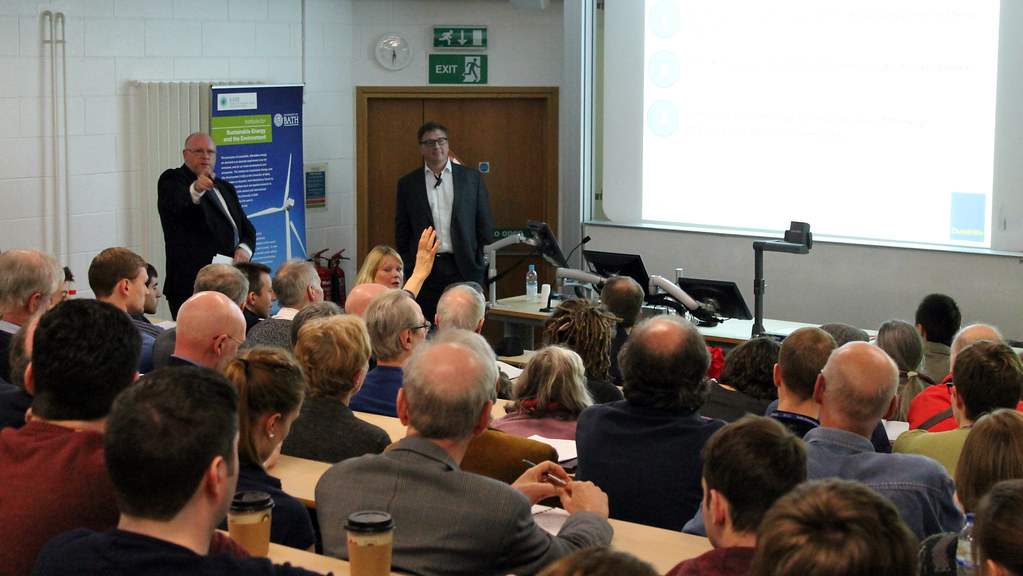The event, part of I-SEE’s seminar series which has previously attracted well-known speakers from academia, industry and government, brought Andrew Quarles, Technical Director for Cuadrilla Resources, to the University to explain why shale gas in the UK is important and how the process of fracking can be safe.
Energy exploration firms, like Cuadrilla, suggest that trillions of cubic feet of natural gas may be locked in shale rock under large parts of Northern England and could help transform our country’s energy needs, mitigating the requirements for future energy imports.
Yet, the process for recovering natural gas from shale through hydraulic fracturing, otherwise known as ‘fracking’, remains a highly contentious one.
In the US, whilst the exploration of natural gas has had a revolutionary effect on the energy industry, the process of fracking has also raised a number of environmental concerns, including the risks of mini-earthquakes, excessive water usage, as well as longer-term questions about the return of polluted water and possible impact on the water table.
In the UK, by studying the rock data for areas in Lancashire, geologists at Cuadrilla identified peculiar patterns to suggest that an area in the upper Bowland had the potential for shale gas. Drilling the Presse Hall well in 2011, the company was able to sample the rock to prove shale gas was present and in abundant supply.
Dr Quarles explained: “In US, most shale gas zones are on the order of 100-300 metres thick. In case of Bowland Shale this was more like 1000m or 1500m thick.
“This depth of rock has some of the highest energy density anywhere in the world for hydrocarbons. Per square mile, there may be more hydrocarbons, more fossil fuel energy, in Lancashire than there are in Saudi Arabia.”
The question remains though what we do about it. Andrew Quarles suggested that energy from shale was very likely to play a part in our future energy mix, but how much we benefit would depend on whether our role was as a consumer or as a producer.
By highlighting various CO2 reduction targets, he argued that natural gas must be one of the key strategies for reducing emissions. As a producer, as with the US experience, more natural gas would lead to cheaper energy and a host of other economic benefits, he suggested.
Accordingly, if shale gas takes off in the UK there would be important benefits for private investment, job creation and energy security. There could also be a knock-on ‘Aberdeen effect’, he suggested, similar to that seen in Scotland after the discovery of North Sea Oil.
Drilling licenses were won by Cuadrilla from the Department for Energy & Climate Change in 2011. The Presse Hall well, the first to be drilled, proved gas was presented but also resulted in small seismic events – the likely cause of the ‘Blackpool earthquake’ felt in November 2011.
Having now proved gas is there the onus is on drilling companies, like Cuadrilla, to prove that the exploration of shale is safe and commercial. “In a wider sense we have to demonstrate that it’s safe,” Mr Quarles said, explaining how the industry plans to work with communities and with partners to sell the benefits of further shale exploration.
Yet with a number of challenging questions from all sides of the audience about the facts, figures and potential environmental consequences of extracting shale through fracking, it appears the industry still has some convincing to do.
I-SEE Director, Dr Tim Mays, said: “It is important to understand and debate important – and potentially controvertial – issues such as fracking from all sides. Andrew Quarles’ seminar provided an excellent opportunity to hear about some of the technical, environmental, social, and financial aspects of fracking, from the perspective of a company well-known and active in this technology. The wide-ranging debate that followed was lively and challenging, and certainly gave everyone present food for thought.”
Mr Quarles added: "Lancashire shale gas has the potential to make a significant dent in the UK’s energy import dependency, and improve our economic and societal security. I enjoyed discussing the issues with a well informed audience at the University of Bath."
The next I-SEE seminar ‘A cool look at global warming’ will be delivered by former Chancellor of the Exchequer, Rt Hon Lord Nigel Lawson, taking place today.
The event will be live-streamed through http://uniofbath.hosted.panopto.com/Panopto/Pages/Viewer/Default.aspx?id=61f86168-3837-43a8-ae3d-37da91e0ea24 ; follow the debate on Twitter using the hashtag #iseefutures .
I-SEE seminar website link: http://www.bath.ac.uk/i-see/events/

